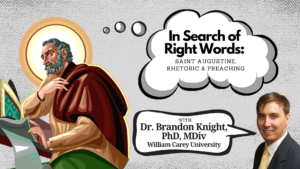 Column Title: In Search of Right Words: Saint Augustine, Rhetoric, and Preaching
Column Title: In Search of Right Words: Saint Augustine, Rhetoric, and Preaching
By Brandon Knight, Ph.D.
William Carey University
September: “Reframing Preaching and Plagiarism”
Column Description: Saint Augustine, Bishop of Hippo, in his work On Christian Doctrine, illustrates the important relationship between preaching and rhetoric. Even in his day, many questioned what use the church could possibly gain from the study of oratory. Nevertheless, Augustine saw something much deeper in communication that many Christians still miss centuries later. This column will be a personal journey through Augustine’s On Christian Doctrine, through which he shows how God can, in fact, use rhetoric to help us see more clearly the beauty of scripture as well as find the right words when articulating gospel truths to others.
December 2023 / September 2023 / May 2023 / April 2023 / February 2023 / November 2022 / October 2022 / July-August 2022 / June 2022 / April-May 2022 / February 2022 / January 2022 / December 2021
December 2023
We live in very interesting times especially as it relates to preaching.
Beyond our being confronted by Artificial Intelligence, pastors are weekly tempted to use sermons constructed by others. The most recent public controversy of sermonic plagiarism occurred in January 2020 by then SBC President Ed Litton.
Although having permission from past-president J. D. Greear, Litton neither mentioned a transition into Greear’s previous sermon nor did he attribute any sections to its original creator. Following accusations of plagiarism, Litton responded by saying, “Like thousands of other Southern Baptist pastors, I labor every week, preparing to stand in front of the congregation God has called me to serve. In preparation for our series on Romans, I used several resources to help me think through how to structure the series and how best to communicate the profound truths we encounter in these passages.”[i]
Litton’s response to plagiarism is insightful when considering the immense burden placed on pastors to create new content week-in and week-out. Such a tension demands further consideration on the role of “community” in sermon preparation.
Interestingly, in On Christian Doctrine, St. Augustine specifically discusses at least one philosophical perspective when considering the use of another pastor’s sermon construction.
Is Delivery without Sermon Composition Deception?
In the final chapters, the bishop notes that some Christian orators may be better at delivery than composing a sermon—a thought that rarely enters our 21st century minds. Such contexts, Augustine argues, allows for the possibility of a Christian teacher to utilize the sermon constructed by a fellow Christian. He says as much when stating, “Now, if such men take what has been written with wisdom and eloquence by others, and commit it to memory, and deliver it to the people, they cannot be blamed, supposing them to do it without deception.”
The caveat, just so we are clear, Augustine notes the process must be performed without deception.
First, one must be honest with the one constructing the sermon. He contends that, “For those who steal take what does not belong to them, but the word of God belongs to all who obey it…” In other words, the bishop sees a connection between Christian teachers who all speak the truth which ultimately belongs to God. This is a different way of thinking for the 21st century Christian pastor. We’ve bought fully into the enlightenment notion that our sermons are our individual possession even though they may be of more service when offered to communal use.
This is actually what occurred between Litton and Greear. Greear revealed that he gave permission to Litton in a publication called “A Statement about My Sermon on Romans 1” in which he says, “I told him that whatever bullets of mine worked in his gun, to use them! My own take on these kinds of things is usually shaped by the input of many godly men and women.”[ii]
Second and lastly, the greatest deception is the one speaking the truth composed by another while living a life in opposition to said truth. Or, as he questions: “For how can they say in words what they deny in deeds?” It is this last form that parallels with today’s understanding of plagiarism, or theft.
Reframing Sermon Prep within Christian Community
Although I do not encourage anyone to use other’s sermons, I respect the bishop’s perspective of sermon construction and delivery. Our sermons are not our own; they are God’s. With this truth in mind, any sermons constructed to lead others to truth can be used by other faithful believers.
A more ethical route for contemporary pastors is by reading other sermons in order to find inspiration. This practice has been essential throughout my time in ministry. I love analyzing and reading the wisdom of others so that when I begin composing my sermon, it is not merely my own ideas (which are few), but a number of wise Christian pastors who have already spoken truth into my life.
“But when true believers render this service to true believers, both parties speak what is their own, for God is theirs, to whom belongs all that they say; and even those who could not compose what they say make it their own by composing their lives in harmony with it.”
Let’s aim for Christian community even in our preaching!
* The views of any CCSN columnists are their own, and do not necessarily represent the views of the CCSN. We invite and embrace a wide range of views and critiques on important communication and cultural issues from a Christian perspective. The CCSN is a community of Jesus followers who study communication. We do not support or promote a particular social, political, or denominational agenda.
Notes
[i] “Redemption Church – Pastor’s Statement,” Redemption Church, accessed December 10, 2023, https://goredemption.com/pastors-statement/.
[ii] J. D. Greear, “A Statement about My Sermon on Romans 1,” JD Greear Ministries (blog), June 26, 2021, https://jdgreear.com/a-statement-about-my-sermon-on-romans-1/.
